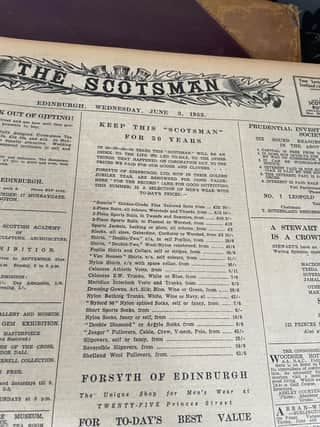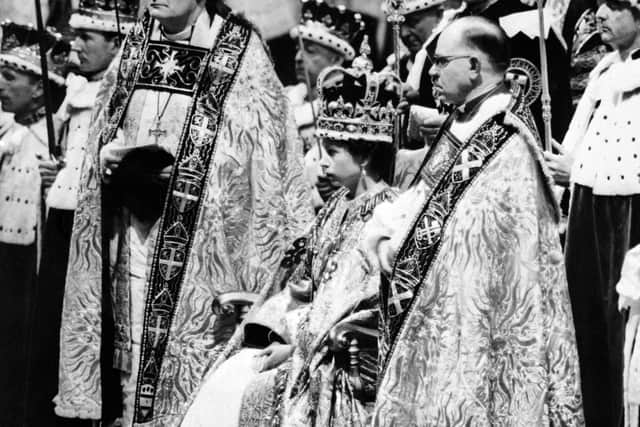'Her peoples cannot but be conscious of her sincerity and burden of responsibility' Scotsman comment on Coronation 1953


“As this day draws to its close,” Her Majesty the Queen said in the broadcast to her peoples last night, “I know that my abiding memory of it will be not only the solemnity and beauty of the ceremony, but the inspiration of your loyalty and affection.”
For those who, for the first time in history, were enabled to watch the ceremony by television the enduring memory is like to be that of a young Queen sincerely pledging herself to the service of her peoples and dedicating herself to her great calling. For the present time that is the essence of the Coronation service. Compact of history though it is, the Coronation is not just a pageant from the past but part and parcel of a living reality.
Advertisement
Hide AdAdvertisement
Hide Ad"I am sure,” the Queen said, “that this, my Coronation, is not the symbol of a power and splendour that are gone but a declaration of our hopes for the future.


"In pompous ceremonies,” and old Elizabethan wrote, “a secret of government doth much consist.” If this is true, the Earl Marshal has nothing to learn. The perfect grace and timing of the whole of yesterday’s magnificent ceremony were a tribute to his powers.
"Historians have analysed the Coronation service and traced its elements to their sources. Quite early in history hereditary right was not regarded by the Church as forming the adequate title-deeds to the Crown. The Church claimed to decide the question of suitability for the office of King. In the tenth century the formulae for the coronation of an Emperor included the clause “And here the lord pope makes the Emperor-elect into a clerk.” The analogy between the consecration of a bishop and that of a King struck the medieval imagination, and the doctrine grew that the King partook of the priestly character. Even today something of this remains when people write of the mystery of the Queen’s anointing.
In addition to the qualifications of hereditary right and consecration the medieval rules required to have the people’s recognition. And recognition yesterday formed an early part of the ceremony, when by loud and repeated acclamations the people signified their willingness and cried out “God Save Queen Elizabeth”.
One change made in yesterday’s ceremony was the transference of the presenting of the Bible from just after the putting on of the Crowd to a point immediately after the Queen’s taking of the oath. It was most appropriate that the Moderator of the Church of Scotland should have been given these words to say, “Here is wisdom; this is the royal law; these are the lively oracles of God,” for the Church of Scotland is historically a Church of the Book which by long custom is carried publicly into her pulpits before the minister takes his place.
As the notes of the pealing anthem die away from memory, it is the thought of the Crown’s function today that remains. “The Lord give you faithful Parliaments and quiet realms” said the Archbishop in benediction. It is perhaps the chief triumph of the British political instinct that Crown and parliament have been brought so completely into harmony. The Crown, it may be said, has known how to yield or has at least learned to do so. The Commonwealth of Cromwell with its regicidal guilt has not survived, through there have been times when Republican sentiment appeared to be strong. In Victoria’s day, for instance, it was not uncommon for a Republic to be regarded as a possible development in this country. And indeed there is a Republic of Eire and a Republic of India. There may yet be a Republic of South Africa. But here at home it is difficult to see what possible advantage would be gained by transferring the public functions of the monarchy to some political figure elected at stipulated intervals.
Other countries have their own political systems, but it has been shown that the British monarchy continues to be adaptable to modern situations. It remains as a symbol of the unity of the Commonwealth. It symbolises also the general conviction of the people of this country that those in the highest station ought to follow in their lives and in the example which they set to others those moral and religious ideal which the nation as a whole accepts. The country has been fortunate in the example which the late Kind set as King and husband and father.
The ceremonies of yesterday show once again that the Queen has adopted these standards. Her peoples cannot but be conscious both of her sincerity and of the heavy burden of responsibility and public duty which she has assumed in fulfilment of her Royal destiny. It is the wish of all her loyal subjects that she may enjoy length of days and a full and happy reign. God save Queen Elizabeth.
Comments
Want to join the conversation? Please or to comment on this article.
